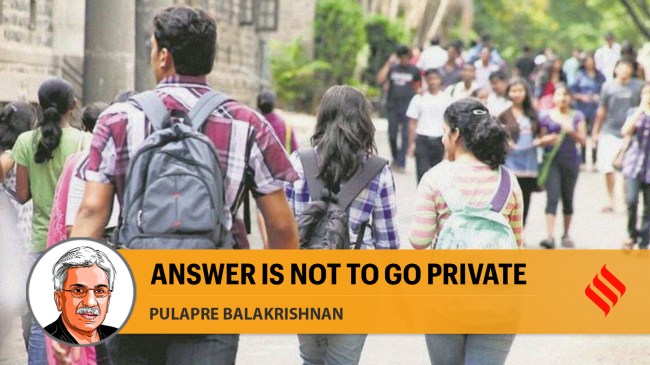Opinion Can private universities really help Kerala’s education system?
While private universities may be secular, it is not necessary that they will also be liberal, that is, open to contending ideologies and permitting a critical stance by members vis-a-vis the power elite
 While Kerala may not have had private universities, it has, for at least a century, had private colleges. (Source: File/ Representational)
While Kerala may not have had private universities, it has, for at least a century, had private colleges. (Source: File/ Representational) There are areas in which Kerala has not been a leader. The setting up of private universities is one. But now an ideological rubicon has been crossed with the state’s legislative assembly recently passing the Kerala State Private Universities Bill (KSPUB). An article in this newspaper (‘Why Kerala has finally opened the door for private universities in the state’, March 29) stated that Kerala is the last state in the country to allow this. The change of mind has very likely been forced by the growing public attention drawn to the exit of college-age Malayalees to institutions outside the state. What will follow the legislative act is a matter of interest. Expectations would best be guided by both the experience with private universities elsewhere in the country and the long history of private presence in higher education in Kerala itself.
There are 471 private universities in India. That makes for over 15 universities in a state on average, a number large enough to influence the character of higher education in their respective states. Has their presence led to higher educational standards? As views on what constitutes a superior education vary, we may use a simple criterion to answer the question, which would be whether students graduating from the private universities are invariably better informed within their area of study and possess greater critical thinking ability. If you are to compare students from the very best undergraduate colleges of the public universities of India with those from the best private universities in their neighbourhood, the answer in many cases is “no”. The reason is not far to seek. The best private universities hire faculty with world-class qualifications, who mostly deliver instruction to global standards. It has been the experience, however, that this offering is not necessarily imbibed. When students are from the wealthiest sections of the commercial classes, being assured of an inheritance, they have no incentive to learn. Of the weak link between well-stocked universities and the quality of their product we should have learned long ago, from the experience of private medical colleges in southern India. India has allowed private enterprise to produce doctors who have, at no point in their past, faced competition, nor will they have to face it at any stage in their future. As long as India’s private universities function as client servers, it would be naive to expect that they can raise the standard of education in this country.
While Kerala may not have had private universities, it has, for at least a century, had private colleges. These are termed “aided educational institutions”, as they receive financial support from the government. We can learn from this history. That seats in the aided colleges are going abegging today shows that public perception of their academic value is low even at the very low fees set by the government. This is not surprising. By far the greater part of these institutions are virtually denominational, with strong caste or religious affiliations. They have been established to promote the career of sectional groups and to reproduce their cultural values. Such a mission is not aimed at providing a superior education, even as it has an ethically questionable exclusionary bias. Most of the private aided institutions have not upheld democratic values either. Their infractions range from dismissing, rather than backing, lecturers attacked by intolerant religious fundamentalists to colluding with conservative students who cancel the screening of films with a depiction of alternative sexuality. So, if private universities in Kerala are to emerge from the same ecosystem, we may expect little improvement by way of educational quality or a shift to a liberal culture.
Finally, while private universities may be secular, it is not necessary that they will also be liberal, that is, open to contending ideologies and permitting a critical stance by members vis-a-vis the power elite. We are seeing this play out right now in the United States, with its leading universities succumbing to the pressure to dismantle whole departments at the behest of a regime hostile to their politics. How the private universities that may emerge in Kerala will handle similar pressure is anybody’s guess but it would be vital to their credibility as universities. Given the immense powers of the state, a tolerant one will be essential to the emergence of liberal private universities here. A university over which the fear of the state hangs like a sword cannot serve the purpose of being a site for the pursuit of knowledge. The KSPUB provides for a far greater presence of the state in governance than is the case in other states in India, with a provision for government representatives in many of the crucial steering committees. Even if such an arrangement is not a deterrent to entry, how it will pan out later on is yet unknown. There is the possibility that it may suppress voices critical of the state’s narrative or insist on partisan schemes adopted by the political party in power.
However, while one should not be overly optimistic of the outcome, one need not be pessimistic either. The future need not be like the past. If even a few excellent, secular and liberal private universities were to emerge in Kerala, competition could nudge its vast public university system to perform at least a little better in serving the aspirations of its youth.
The writer is an economist





